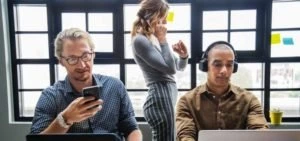
Now, I am admittedly not an early adopter of many brand-new technologies – digital, self-care, or otherwise, but I am also not an avoider of adoption, either. Rather, I am a cautiously optimistic adopter, who first observes trends as they emerge and evolve, digs deeper into those changes’ practical applications and social implications, and then finally makes purchase decisions accordingly.
I am now an “old enough” lawyer to have spent a good deal of time in the library researching laws, rules, regulations, and cases manually. By using regularly updated paper books and journals. (Off-topic, but a pleasant memory – There really is no more satisfying sensation than rummaging through research materials and finding unexpected and helpful tangents. And…that lovely, musty smell of “the stacks”.) One law firm I worked at during the 1980s actually had its own (big) library, with a full-time librarian who actually wore bowties every day.
But I also came of-age during the early phase of electronic legal research. We had to sit at dedicated teletype keyboards, enter our queries, wait a while, and then pull off tractor-printed page-after-page of results to sift-through and read. (Another pleasant memory – While likely somewhat noxious in reality, who really did not love the smell of that blue-purple ditto machine copies?)
To consult with an experienced business law lawyer today
855-780-9986
These days lawyers rarely have to “go to the library” to keep up with developments in law, business, regulation, and politics. The reality is there is a seemingly infinite pool of no-charge and subscription resources available which can algorithmically assist with research from the general to the most arcane details under question. Imagine starting from a state or federal statute of overall import, moving next to the administrative agency with jurisdiction, and then to that agency’s specific regulations and interpretations. Myself, I have done so more times than I can remember with topics as diverse as condominiums, cooperative, and owners associations, tax law, securities regulation, and environmental law. Truly, just to name a few.
Now for the meta-trend. Those same online resources (certainly the “free” ones) are available to consumers of the law.
So, instead of starting by visiting with your friendly neighborhood barrister (just look for “the shingle”), people who perceive they have personal, business, real estate, or other legal needs engage in self-help. Why not? There are TV ads, internet ads, and even print ads (what are those?…) for artificial intelligence-based services which will appear to walk consumers through questions about their concerns, point them to more specific resources, and even auto-populate and generate “legal documents” in response.
Back to the cautiously optimistic adopter note above. Legal training provides law students with a specific set of knowledge, skills, and abilities. For example, the ability to patiently (and subtly) listen, interview, evaluate, counsel, negotiate, and mediate a client’s needs. And as young lawyers gain experience in the real world, the sense to know they sometimes need to take actual time to think through the facts and law which confront them. Marrying all of this classroom and “school of hard-knocks” training with the “brave new world” (direct literature reference…) of online research resources, leads to an ever-increasing high-tech/high-touch lawyer-consumer relationship.
Having done their own research reconnaissance, clients now tend to arrive at a lawyer’s doorstep better prepared for the substantive and process issues which typically revolve around contracts, transactions, and even trials. Resilient lawyers are well-equipped to function in this more informed and interactive environment. I tell my own law students that no one knows clients’ needs and business better than the client themselves; it is our job to educate clients about the pathways which are actually available within the law to help them end up at or as close as possible to their anticipated goals.
Click to contact our Florida Attorneys today
Let us all benefit from this trend of increased research and self-help resources by taking just one small step back. We should dedicate some time to listen (and that means both lawyers and clients), to apply the technical and human skills developed over a career in law, business, and life in-general, and then to use that time and those skills to identify and implement effective, efficient, and economical outcomes. Who knows? We might even have some fun together doing just that.
– For more information, call Philip N. Kabler of the Gainesville, FL office of Bogin, Munns & Munns at 352.332.7688, where he practices in the areas of business, banking, real estate, and equine law. He has taught business and real estate law courses at the University of Florida Levin College of Law and Warrington College of Business Administration. And is now the President-Elect of the Eighth Judicial Circuit Bar Association.
Submit a Consultation Request form today
NOTICE: The article above is not intended to serve as legal advice, and you should not rely on it as such. It is offered only as general information. You should consult with a duly licensed attorney regarding your Florida legal matter, as every situation is unique. Please know that merely reading this article, subscribing to this blog, or otherwise contacting Bogin, Munns & Munns does not establish an attorney-client relationship with our firm. Should you seek legal representation from Bogin, Munns & Munns, any such representation must first be agreed to by the firm and confirmed in a written agreement.
Call or Submit Our Consultation Request Form Today





